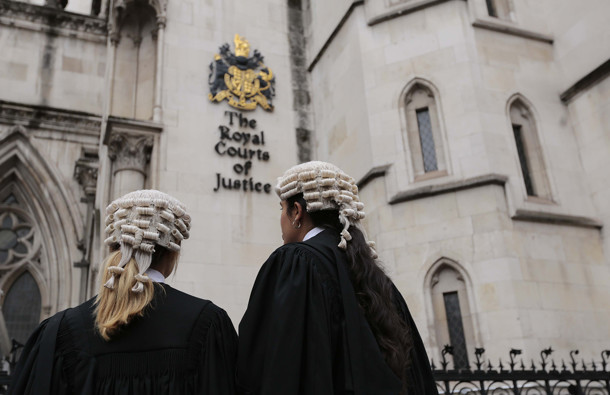
Interview with Future Pupil Barrister at Exchange Chambers, Julius Klutse
June 29, 2023
The Journey of a current undergraduate student, Kehinde Emmanuel Oladele
June 30, 2023In this Article Hana Ingram interviews Omar Negm on his journey into law and the diversity in the legal workplace.
Hi Omar! Could you please start by giving a brief background on your legal journey so far?
Before I decided to pursue my legal studies, I completed a bachelor’s degree in financial and business economics in Canada, and then I worked as an accountant at Red Bull and for a non-profit organization. After working in accounting for over a year, I decided to make a career change; I didn’t enjoy accounting that much and I wanted to try and pursue a legal career, so I made the decision to study law in the UK at UCL. During my first year of studying, I applied to first year vacation schemes, and although I did not get accepted into any, I did manage to secure four open days, which were all very insightful and helpful experiences.
In the second year of my LLB, I applied to vacation schemes at around 13 firms, and I got accepted into two of them – at Linklaters and Deloitte. Following these schemes, I got Training Contract offers from both, and I decided to pursue my training with Linklaters. I recently finished the third year of my LLB, and I am currently working on a legal mentorship program called The Mentors Collective (TMC). However, I am set to begin my SQE this September, which I will hopefully complete before starting my Training Contract in September 2024. I am really looking forward to it, particularly because, since it is the Middle Eastern contract, I will be able to train for one year in London and one year in Dubai.
The lack of diversity within the legal field is often flagged as a key concern amongst aspiring solicitors. In recent years, law firms have attempted to tackle this issue by developing initiatives and programs in pursuit of racial equality, the advancement of women and accessibility of disabled employees, amongst other minority inclusion efforts. As a Muslim, do you feel as though law firms are doing enough to promote ethnic diversity and equal opportunity in the workplace?
I think law firms differ greatly when it comes to embracing diversity. Some firms really work to promote the careers of employees from different cultural and religious backgrounds, while others still have a lot of work to do in this area. However, I also believe that even the firms that do make an effort to increase diversity, do so on a more general level, and in a manner that doesn’t really cater to Muslim employees specifically. We are often slotted into a very broad diversity agenda, and the issue with this generalised approach is that it does not acknowledge some of the specific requirements that practicing Muslim employees have, such as praying five times a day or fasting during Ramadan. I do not think this issue is isolated to the legal industry, I think it is prevalent in many professional work environments in the UK, and I believe it simply stems from a lack of understanding, rather than prejudice. I have personally found that, once I explain any aspect of my religious practice to an employer or fellow employee, they have been very accommodating. Both my experiences with Linklaters and Deloitte were fantastic in terms of having my cultural and religious identity understood and embraced. However, over the years, I also learned that I often have to take the initiative to explain a religious tradition or belief in order to benefit from this accommodation. I was, and still am, very comfortable to do so, however many of my Muslim peers are not, and will often minimise their religious identity while at work, in order to fit in. This is why I think it is important for legal employers to make a concerted effort to learn more about at least the basics of Islam, as part of their diversity and inclusivity initiatives.
You recently posted a Linkedin poll asking whether members would be interested in a “Know Your Practicing Muslim Colleagues” series, focusing on educating non-Muslim professionals about the Islamic faith – what made you decide to develop this type of resource?
The main driver of this resource is to address a lack of education and basic knowledge on Muslims and Islam in professional settings, not only in the UK, but in most western societies. The most common depiction of Muslims in film, media and news continues to be reducing them to terrorists or the “other”, and because of this very reductive representation, many people do not make an effort to learn about what it actually means to be a Muslim. I thought that Linkedin, as such a far-reaching professional network, would be a good platform to have these kinds of informative discussions on Islam, and to educate non-Muslim professionals on their Muslim peers. The purpose of this educational series is not to engage in religious debate, it is simply about educating people on the beliefs of practicing Muslims. This is another aspect that I believe contributes to the lack of knowledge around the Islamic faith – that there is a spectrum of Islamic practice. There are some Muslims who practice their faith fully and adhere to the Quran and sunnah on a daily basis, while others do not practice at all, and many are in between. I think this broad spectrum creates further confusion for employers; for example, when I was still working as an accountant, I was asked why I did not drink alcohol and why another Muslim employee in the office did. In these situations, I explain what the rules of the religion are, but how there is, in reality, many varying levels of adherence and practice amongst Muslims. I have also found that it is difficult to explain my religion by comparing it to other faiths because, as Muslims, we have so many unique practices that do not parallel the practices of other religions.
There is a lot of momentum going on currently in terms of enhancing knowledge of Islam in professional environments, and I think in the legal field the most active contributor is the Muslim Lawyer Hub, which works with both aspiring solicitors from diverse backgrounds and legal employers to diversify the legal field. However, there is still a lot of work to be done to make this educating initiative more widespread, engaging in these conversations with legal employers to give them the knowledge to accommodate the needs of their Muslim employees as part of their diversity agendas.
Can you talk me through the process of obtaining your Training Contract at Linklaters?
This process started during my first year of legal studies, when I applied to a large number of first year schemes and open days, around 24 in total. I did not get accepted into any of the schemes, however, as I mentioned earlier, I managed to secure four open days. This was obviously quite disappointing, but it also gave me a great learning opportunity to reflect on and improve my application strategy; I took the time over the summer following first year to try and understand where my applications went wrong and how to develop my written answers and my overall approach in order to have more success in the next application cycle. During my second year, when I applied to around 13 vacation schemes, my approach was very much informed and altered based on the previous applications I had done. I also really tried to broaden the variety of firms I targeted (I applied to Magic Circle and Silver Circle firms, firms in the US, the Big Four firms) because I felt this would increase my chances of getting accepted. After receiving invitations to partake in assessment centers with Linklaters, Clifford Chance, Deloitte and KPMG (four firms that are very different in terms of size, approaches to legal work and professional settings), I managed to secure vacation schemes with Linklaters and Deloitte. I completed these schemes back-to-back (something I do not recommend!), received Training Contract offers from both, and decided to pursue my training with Linklaters.
This decision was difficult, as I thoroughly enjoyed both vacation schemes and was very conscious of the unique advantages that working with Deloitte offers, however I ultimately felt it would be more beneficial to begin my legal career in a more established legal practice.
What factors did you consider when deciding which firms to apply to?
I focused on firms that I had already interacted with in my first year of legal studies, such as those that I had attended events for, so that I went into the application process with first-hand insight into the firm and with connections to employees who worked there. I think this approach makes a lot of sense because, if a firm receives over 500 applications each cycle, in order to stand out an applicant must have a deeper knowledge of the firm that is more specific than the information contained on its website. I also looked at my Linkedin network to see which firms I already had connections, who I could reach out to for help during the recruitment process. I think getting this tailored advice is really important, and this is what I tell the mentees of my mentorship program all the time – that if you do not obtain this tailored advice, you increase your risk of being blindsided during the assessment process. It really is about reaching out to employees who have already gone through the same recruitment process (and most importantly, succeeded), and getting their specific insights to help prepare yourself for this process.
Alongside this approach, I applied to the Big Four firms because of my background in accounting. Through this previous work experience, I am extremely familiar with the auditing, consulting and other services these firms provide, and the ways in which they carry out this work. Moreover, I was curious to see how the legal aspect would fit in the accounting industry, and I was intrigued by the idea that these firms are essentially selling one solution to the client – for example, if a client wanted to enter into a M&A transaction, a firm like Deloitte could handle the entire transaction, from financial to legal, without the client having to hire any external advisors. I find this comprehensive approach very dynamic, and I like the idea of being able to work alongside a range of professionals, including consultants and auditors.
You mentioned earlier that you have set up your own legal mentorship program, can you elaborate on this initiative?
I set up a mentorship program last August, largely by accident! I initially posted on LinkedIn saying that I had the time to mentor five people to help them with any aspect of their application process. To my surprise, I received endless applications, and that made me think that, if there are so many aspiring solicitors out there who are feeling overwhelmed by the applications process and are in need of guidance, I should just create an initiative with the capacity to help as many of them as possible. I set up a program called The Mentors Collective (TMC) last August. In the beginning, we had around 20 mentees and six mentors, and we have been growing consistently ever since. TMC currently have approximately 95 mentees and 40 mentors, and these numbers will grow by the mid-June when the program is officially launched on LinkedIn. You can sign up as a mentee on our website: www.thementorscollective.co.uk
In TMC, we operate a little differently compared to other mentorship programs – we do not assign mentors to mentees; instead, we created a platform that would allow mentees to book one-on-one sessions with the mentor of their choosing, based on the specific background of the mentor. These sessions usually consist of a 30-minute chat where the mentor will help with drafting applications, preparing for assessment centers, etc. This approach also provides our mentors with flexibility, in terms of how and when they schedule these mentorship sessions. This year has been very successful for the program; so far, we have helped over 40 individuals secure vacation schemes, internships and placements. It is obviously a lot of work, but it is also very rewarding to have a role in helping people start their careers.
How do mentors sign up to your program?
The majority of our current mentors contacted me saying that they were interested in working in the program in response to my LinkedIn posts about it. However, we will also begin a mentorship recruitment process by mid-June after the official launch of the program, and this will hopefully be a much larger scale hiring process accessible to any individual who is interested in mentoring. I encourage anyone working within the legal field to join – the time commitment can be as minimal as half an hour a week, and it truly is a very rewarding project to be a part of. You can sign up as a mentor on our website: www.thementorscollective.co.uk
Can you highlight a few common issues that mentees have brought to their mentorship sessions, or any trending difficulties that you believe aspiring solicitors face during a firm’s recruitment process?
I think the main trend amongst applicants is a lack of understanding with regards to what exactly the law firm they are applying to is asking of them during the recruitment process. For example, when a firm asks the applicant a question about commercial awareness, many will simply equate commercial awareness with reading the news and fail to give a more nuanced and in-depth answer which reflects a concrete understanding of this concept and its importance within the legal field. This is one area of confusion that TMC tackles through weekly commercial awareness sessions that are open to all of our mentees. We also provide group interview preparation sessions to give our mentees insight into the kinds of questions they may be asked in an interview and how to successfully answer them.
In a review of our mentorship program that we recently conducted, a lot of our mentees said that in previous applications they really struggled with commercial awareness questions, and that they either did not fully understand this concept to begin with or that they really needed support. I think, most applicants are willing to do the hard work, they just need the guidance, and this is where mentors can really prove their value. Another key distinguisher about TMC is that because our mentors come from such varied and distinguished backgrounds, each mentee has the opportunity to seek mentors with professional experiences that reflects their own professional goals. For example, we really encourage our mentees to seek sessions with mentors who are working/have worked in the law firm the mentee is applying to, in order to obtain first-hand tailored insight and advice about that particular firm’s application process. One of the most frustrating questions I get asked on Linkedin by aspiring solicitors is, “how to prepare for assessment centres” – this question assumes that every firm has a similar assessment process, and that generic advice will help an applicant succeed. Unfortunately, this is not the case; applicants need to seek advice that is specific to the firm they are applying to, and they need to understand that the qualities and skills that a firm requires of them may differ widely based on each individual firm’s core values, working culture and practice areas.
You’ve undertaken quite a diverse range of employment and extracurriculars during and after your university studies – what experiences did you choose to highlight in your Training Contract applications and why?
Before applying to a firm, I think it is important to look at its values and try to align yourself with these values at each stage of the application process. One piece of insight that I received from my own mentor is that the best lawyers are those who possess both technical legal skill and sales skills, because ultimately a lot of the profession involves selling services and pitching ideas to clients. To do this, lawyers must have a level of entrepreneurial abilities, and most law firms will look for evidence of entrepreneurship in their applicants – they look for applicants who are active and who take the initiative to seek opportunities or create their own, within or outside of the legal field.
In my applications, I highlighted my previous experiences co-founding two successful non-profit organizations that are still running today. I capitalized on these achievements as much as possible when answering application questions, focusing on the skills I developed through them and, most importantly, how these experiences will enable me to add value to the firm.
I also tried to ensure that my passion for the law was evident in my applications by providing evidence of being active in UCL’s law society and of my participation in various client interview and negotiation competitions.
Lastly, I expanded on the transferable skills that I developed in my previous accounting work (such as communication and teamwork abilities), and my familiarity with professional working environments in general. Ultimately, in each application I tried to emphasize my best qualities and accomplishments in a way that specifically related to each firm’s values and requirements.





